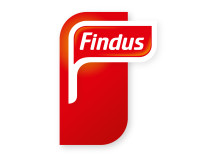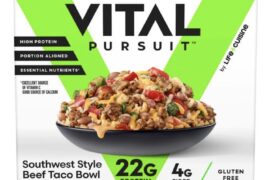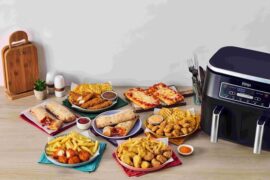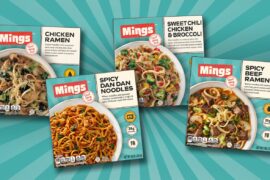Approximately 450 Nomad Foods employees engaged in producing Findus frozen ready meals and vegetables in Bjuv, Sweden, have been notified that the company intends to cease operations by the end of 2016. Among factors cited for the looming shutdown are ongoing challenges to profitability caused by excess capacity in Europe’s food industry, duplicate production at various company-owned sites, and the need to implement “a more efficient supply chain.”
The large factory complex packs hundreds of products for retail and foodservice customers in Sweden, Denmark, Finland and beyond. Once shuttered, production will be shifted to the company’s plants in Bremerhaven and Gross Reken, Germany.
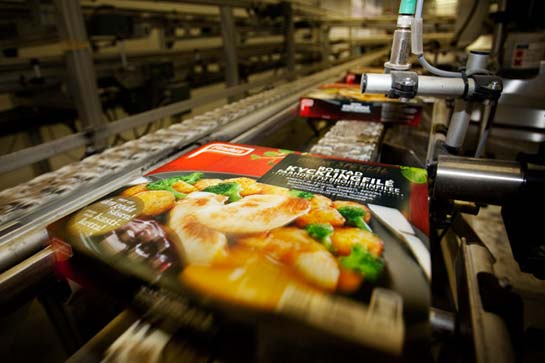
Bluntly describing the decision to consolidate output elsewhere as “grim news for employees” in Bjuv, Henrik Hjalmarsson, chief executive officer of Findus Sweden AB, said that the factory’s geographic location is a major reason why it will not stay in business despite the fact that the unit generates roughly SEK 2.5 billion in revenues per annum.
“Although Sweden and Scandinavia are key markets, the investment in longer transport routes from Bjuv, and thus higher costs of distribution to other major markets in the south and west of Europe, makes it harder for us to compete,” he said.
Closure of the flagship factory will reportedly not affect Findus operations in Loftahammar. Furthermore, the company is inviting sales, marketing and key support personnel to continue working at a new head office situated 40 miles south of Bjuv in Malmö. As such, about 175 people will likely remain on the job in Sweden.
The production of peas, which typically runs full-tilt during July and August, is expected to take place on schedule at the Bjuv plant this summer, and the warehousing of frozen products will remain on the premises until further notice is given.
According to Hjalmarsson, the pending shutdown “does not mean that Findus will stop buying products or raw materials from Sweden.” It is estimated that considerably more than 50% of the nation’s annual pea harvest is processed by the company.
Meanwhile, management representatives will hold meetings with trade union officials to discuss plans for the pending shutdown.
“I do not want to speculate on how fast we can complete the negotiations or when the layoffs can be implemented,” stated the ceo. “My focus in the near term is obviously on my team, and to find forms of cooperation with the municipality and other relevant organizations to alleviate the impact of the decision.”
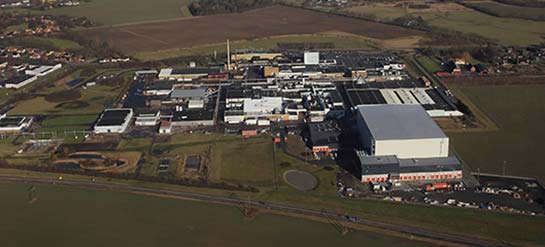
Sales, Earnings, Profits Fall
The announcement coincided with the release of Nomad Foods’ financial results. During the three-month period ending on December 31, 2015, the company recorded a 3.3% drop in sales to EUR 528.8. Earnings fell by 17.2% to EUR 89.9 million, while adjusted profit decreased by 24.9% to EUR 44.7 million.
The decline in profits was attributed to gross margin shrinkage from 33.1% to 29.4%, brought on in large part by price cutting pressure from discount retailers. Increased spending on promotions to stimulate consumer demand also negatively affected the bottom line.
“While market conditions remain challenging, we managed to slow the rate of sales decline in the final quarter and maintained margins and cash generation in line with expectations,” said Stéfan Descheemaeker, Nomad’s chief executive officer. “I remain confident that our strategy is the right one and will deliver progressive improvement through 2016. The integration of the Findus businesses continues to proceed in line with our expectations, and I am pleased with the pace we are realizing synergies and merging our business processes. Optimizing our manufacturing footprint is a critical step towards achieving our objectives.”
The Felton, England-headquartered group, which also owns the iconic Birds Eye and Iglo labels and ranks as the largest branded frozen foods company in Western Europe, acquired London-based Findus Sverige AB and its subsidiaries (the “Findus Group”) on November 2, 2015, from LionGem Sweden 1 AB, a company backed by a group of investors including Highbridge Principal Strategies, Lion Capital LLP and Sankaty Advisors, for approximately £500 million. The purchase included the Findus Group’s continental Europe businesses in Sweden, Norway, Finland, Denmark, France, Spain and Belgium, as well as the intellectual property and commercialization rights to the Findus, Lutosa and La Cocinera brands in respective markets. The acquired operations employ approximately 1,500 workers at six manufacturing facilities, boosting the group’s combined payroll to 4,300 people at 10 factories and numerous offices in 15 countries.
The Iglo Group was purchased by Nomad Foods on June 1, 2015. Prior to that, the investment vehicle formed in 2014 by billionaires Noam Gottesman (founder and chief executive officer of TOMS Capital) and Martin E. Franklin (co-founder and chairman of Jarden Corp., a diversified consumer products company with annual sales of over $8 billion) did not have any active operations. Accordingly, reported figures for the nine months ending on December 31, 2015, include only the seven-month results of the Iglo Group from June 1 and the two-month results of the Findus Group from November 2.
In May of 2015, Nomad Foods changed its financial year-end to December 31 from March 31 in order to align with the Iglo Group’s historical reporting calendar. As a result, its posted results for the 2015 financial year are for the nine-month period that ended on December 31.
For the pro forma “full year” ending on December 31, revenues decreased by EUR 61.6 million, or 2.9%, to EUR 2,051.7 million. Adjusted gross profit fell by EUR 54.3 million, or 8.1%, to EUR 618.6 million. The sales performance reportedly was impacted by continuation of a tough grocery retail environment in the main markets of Britain, Germany and Italy.
Revenues for the nine months ending on December 31, 2015, were EUR 894.2 million, resulting in a loss after tax of EUR 337.3 million attributed to non-cash charges related to the founder preferred shares annual dividend, a warrant redemption amount of EUR 348.6 million, and exceptional costs of EUR 58.1 million.
Noam Gottesman, Nomad Foods’ co-chairman and founder, commenting on the company’s quarterly and annual results, stated: “We are focused on supporting and nurturing our iconic brands to stabilize sales, and are executing upon our strategic vision to deliver long-term growth. We believe Stéfan (Descheemaeker) and the whole team are making the right decisions, and we expect to experience meaningful signs of improvement through the course of 2016. While we have some challenges, there are also ample opportunities – organic and external. I believe that as we look ahead, we are well-positioned to build upon a great business and create significant value for all of our stakeholders.”
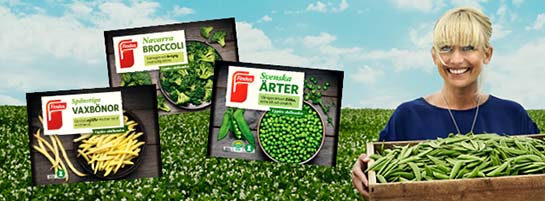
End of Era Looms in Bjuv
Shutting down production operations in Bjuv will mark the end of an era for one of Europe’s leading frozen vegetable growing and processing centers, with roots dating back more than 70 years. Findus was founded there in 1941 by Freja Marabou, a leading Swedish chocolate and confectionery manufacturer. Initially specializing in canned fruits, it introduced frozen berry and spinach products to retail stores in Sweden during 1945. The company also established an agricultural research station and set up the first of seven experimental farms that would eventually occupy some 2,000 acres in southwestern Sweden, as fields and factory were inseparably connected in the march toward making Findus one of the most widely distributed frozen food brands in Europe.
Under the leadership of Managing Director Lars Anderfelt, the Findus product line expanded significantly in the 1950s and thereafter to include fish and seafood dishes, crispy pancakes, pasta, pizza, ready meals and other items. Crediting much of the company’s success to tightly-knit collaboration among researchers, farmers, technical, commercial and administrative staff, he stated: “Apart from this, nothing popularizes frozen foods more quickly than the development of good new products. They are the lifeblood of our business.”
By 1958, the year the world’s largest belt freezer for peas was installed at the Bjuv factory, the company’s export engine was firing on all cylinders. The United Kingdom, in particular, had become a major growth market for Findus peas. Germany was next on the list for further penetration, with spinach, soup vegetables and fish sticks leading the charge.
Nestlé Buys Findus
When Nestlé acquired Findus in May of 1962, the 1.5 million-square-foot plant in Bjuv was providing gainful employment for upwards of 3,000 people. The Vevey, Switzerland-headquartered conglomerate’s purchase and financial clout set the stage for a head-on battle for the hearts, minds, stomachs and pocketbooks of European consumers between Findus International S.A. Nestlé and Unilever-Birds Eye, the two biggest players on the scene.
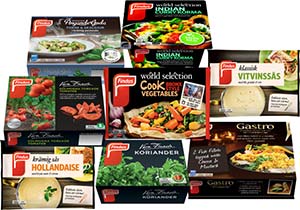 Nestlé’s entry into the frozen food business was capitalized at £16 million, with 80% ownership of the new entity in its hands and the remaining share held by Marabou. Assets at the time included factories in Sweden, Denmark and the UK, plus companies in Italy, Belgium and Germany.
Nestlé’s entry into the frozen food business was capitalized at £16 million, with 80% ownership of the new entity in its hands and the remaining share held by Marabou. Assets at the time included factories in Sweden, Denmark and the UK, plus companies in Italy, Belgium and Germany.
The parts of Europe where competition for sales among shoppers was especially fierce included England, Germany, Italy, Belgium, Scandinavia and Austria. The shining jewel of the Findus crown was the ultra-modern factory in Bjuv. It ranked as the largest facility of its kind on the Continent at the time, bolstered by output from a major fish plant 600 miles north of the Arctic Circle at Hammerfest, Norway, and other factories in Denmark and England.
The 1960s and ’70s proved to be the Golden Age of frozen food brand building across Europe and in the United Kingdom, with Unilever-Birds Eye and Nestlé-Findus in the vanguard of the convenience products revolution. Birds Eye at the time was doing about six times more volume in UK than was Findus.
When the “Battle of the Giants” was joined, Nestlé-Findus CEO Anderfelt said he was happy to have Unilever as a competitor, since “they are not price conscious and neither are we.”
James R. Parratt, chief executive of Birds Eye, replied: “We welcome Findus as a competitor.”
For decades to come both companies invested significantly to educate the trade and consumers about the high quality of industrially produced frozen foods and utmost importance of maintaining the cold chain from time of manufacture through distribution and handling, up until the ultimate point of delivery to the end user.
In some markets, among them Austria, competitors Findus and Iglo teamed up to jointly produce and pay for television advertisements aired to promote frozen foods in general, without mentioning brand names. In those days, the focus was on convincing consumers that quality was worth paying for.
Impact of Discounters and Private Label
Then came the 1980s and ’90s, which saw steady expansion in the private label sector at the expense of brands, a trend that continues to some extent to this day. Intensifying price pressure from “value for money” deep-discount retailers and rising demand for “cheap and cheerful” products among budget-minded consumers has hit higher-priced brands hard in terms of both market share and profitability.
In 2000 Findus was sold to EQT Scandinavia BV, a Wallenberg Group unit engaged in taking over controlling interests of mid-size firms based in Northern Europe. CapVest acquired the company in 2006, creating Foodvest as a holding company of Findus and Young’s Seafood in the UK. In 2008 Findus was purchased by Lion Capital, a private equity fund. A year later, in the UK, the Findus brand returned to the control of Foodvest after several years of being manufactured under license by a separate company. Meanwhile, Foodvest was renamed the Findus Group.
Today Nomad Foods owns all Findus name brands with the exceptions of Frisco Findus in Switzerland, which is a Nestlé unit, and the Findus UK holding of Lion Capital, which is expected to rebrand its Findus products line in Britain. – Reported by John Saulnier

